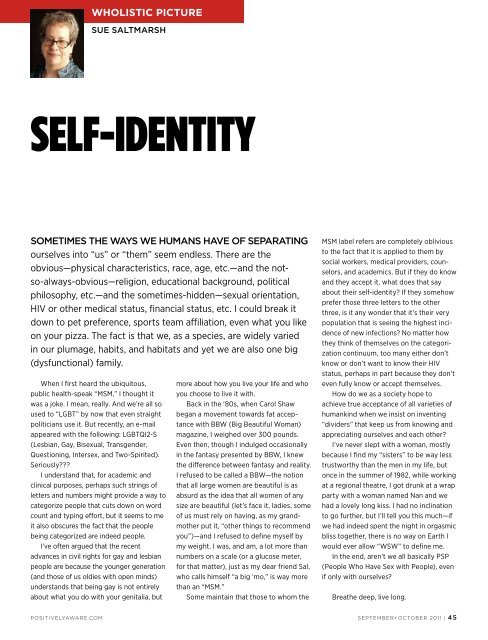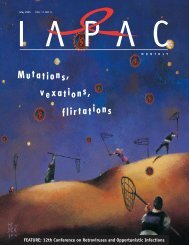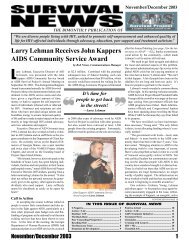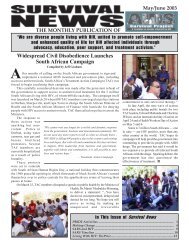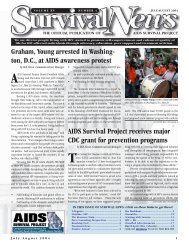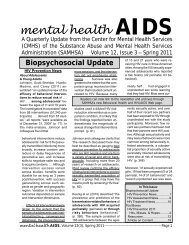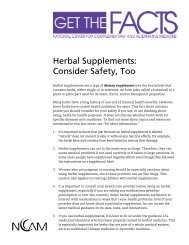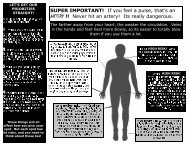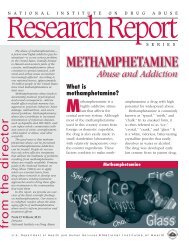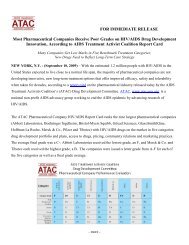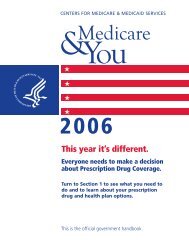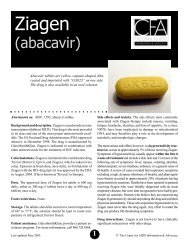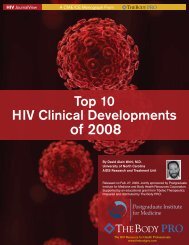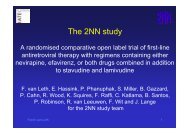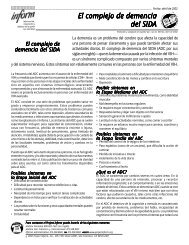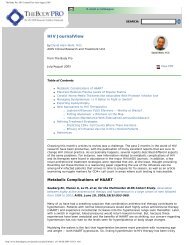Briefly - CD8 T cells - The Body
Briefly - CD8 T cells - The Body
Briefly - CD8 T cells - The Body
You also want an ePaper? Increase the reach of your titles
YUMPU automatically turns print PDFs into web optimized ePapers that Google loves.
wholistic PictuRe<br />
sue salTmarsh<br />
self-identity<br />
someTImes <strong>The</strong> ways we humans haVe of seParaTIng<br />
ourselves into “us” or “them” seem endless. <strong>The</strong>re are the<br />
obvious—physical characteristics, race, age, etc.—and the notso-always-obvious—religion,<br />
educational background, political<br />
philosophy, etc.—and the sometimes-hidden—sexual orientation,<br />
HIV or other medical status, financial status, etc. I could break it<br />
down to pet preference, sports team affiliation, even what you like<br />
on your pizza. <strong>The</strong> fact is that we, as a species, are widely varied<br />
in our plumage, habits, and habitats and yet we are also one big<br />
(dysfunctional) family.<br />
When I first heard the ubiquitous,<br />
public health-speak “MSM,” I thought it<br />
was a joke. I mean, really. And we’re all so<br />
used to “LGBT” by now that even straight<br />
politicians use it. But recently, an e-mail<br />
appeared with the following: LGBTQI2-S<br />
(Lesbian, Gay, Bisexual, Transgender,<br />
Questioning, Intersex, and Two-Spirited).<br />
Seriously???<br />
I understand that, for academic and<br />
clinical purposes, perhaps such strings of<br />
letters and numbers might provide a way to<br />
categorize people that cuts down on word<br />
count and typing effort, but it seems to me<br />
it also obscures the fact that the people<br />
being categorized are indeed people.<br />
I’ve often argued that the recent<br />
advances in civil rights for gay and lesbian<br />
people are because the younger generation<br />
(and those of us oldies with open minds)<br />
understands that being gay is not entirely<br />
about what you do with your genitalia, but<br />
more about how you live your life and who<br />
you choose to live it with.<br />
Back in the ‘80s, when Carol Shaw<br />
began a movement towards fat acceptance<br />
with BBW (Big Beautiful Woman)<br />
magazine, I weighed over 300 pounds.<br />
Even then, though I indulged occasionally<br />
in the fantasy presented by BBW, I knew<br />
the difference between fantasy and reality.<br />
I refused to be called a BBW—the notion<br />
that all large women are beautiful is as<br />
absurd as the idea that all women of any<br />
size are beautiful (let’s face it, ladies, some<br />
of us must rely on having, as my grandmother<br />
put it, “other things to recommend<br />
you”)—and I refused to define myself by<br />
my weight. I was, and am, a lot more than<br />
numbers on a scale (or a glucose meter,<br />
for that matter), just as my dear friend Sal,<br />
who calls himself “a big ‘mo,” is way more<br />
than an “MSM.”<br />
Some maintain that those to whom the<br />
MSM label refers are completely oblivious<br />
to the fact that it is applied to them by<br />
social workers, medical providers, counselors,<br />
and academics. But if they do know<br />
and they accept it, what does that say<br />
about their self-identity? If they somehow<br />
prefer those three letters to the other<br />
three, is it any wonder that it’s their very<br />
population that is seeing the highest incidence<br />
of new infections? No matter how<br />
they think of themselves on the categorization<br />
continuum, too many either don’t<br />
know or don’t want to know their HIV<br />
status, perhaps in part because they don’t<br />
even fully know or accept themselves.<br />
How do we as a society hope to<br />
achieve true acceptance of all varieties of<br />
humankind when we insist on inventing<br />
“dividers” that keep us from knowing and<br />
appreciating ourselves and each other?<br />
I’ve never slept with a woman, mostly<br />
because I find my “sisters” to be way less<br />
trustworthy than the men in my life, but<br />
once in the summer of 1982, while working<br />
at a regional theatre, I got drunk at a wrap<br />
party with a woman named Nan and we<br />
had a lovely long kiss. I had no inclination<br />
to go further, but I’ll tell you this much—if<br />
we had indeed spent the night in orgasmic<br />
bliss together, there is no way on Earth I<br />
would ever allow “WSW” to define me.<br />
In the end, aren’t we all basically PSP<br />
(People Who Have Sex with People), even<br />
if only with ourselves?<br />
Breathe deep, live long.<br />
POsitiVElyAwARE.COM sEPtEMBER+OCtOBER 2011 | 45


